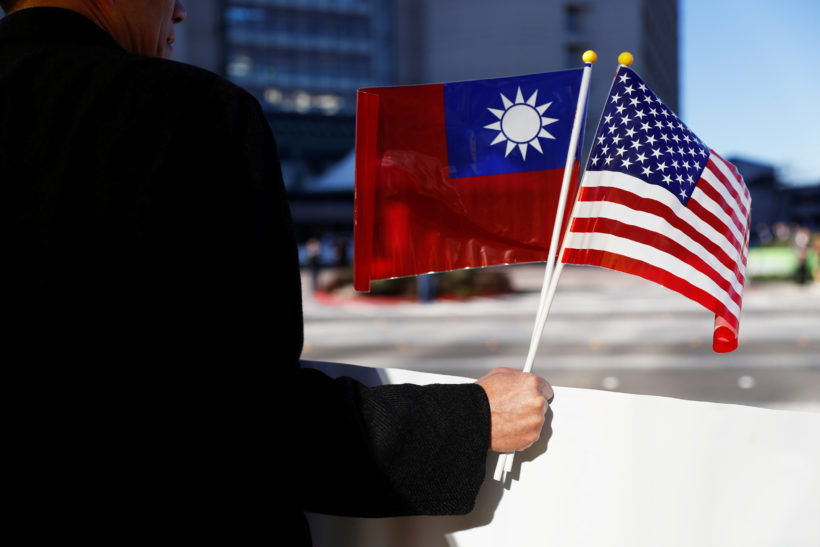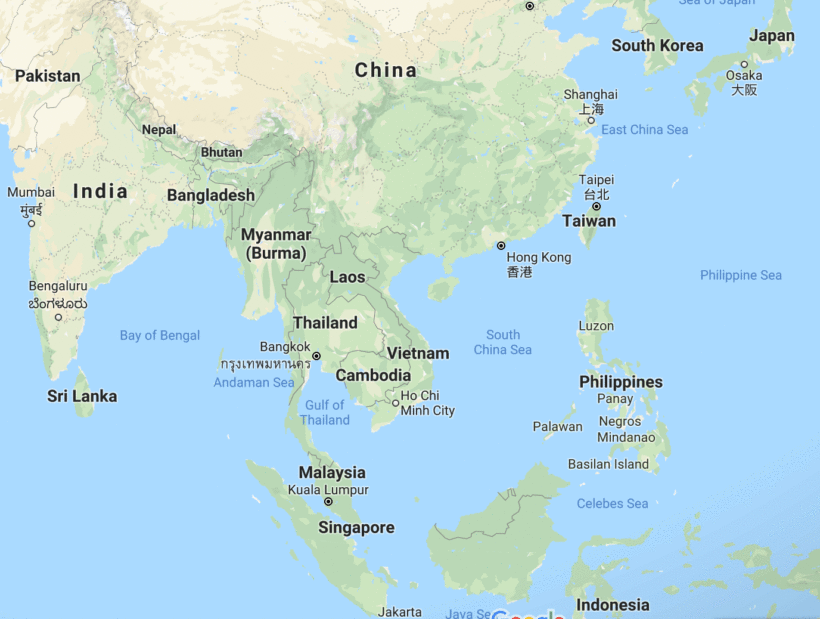
A man holds flags of Taiwan and the United States in Burlingame, California. The Trump administration has ramped up support for Taiwan through arms sales and visits by senior U.S. officials. (Photo: Stephen Lam / Reuters file)
redo Jump to...
print Print...
(from AFP Agence France-Presse at France24) — The United States on Monday, Oct. 26 said it had approved a $2.4 billion sale of 100 Harpoon coastal defense systems to Taiwan, defying Beijing’s anger over a $1 billion missile deal [the U.S. made with Taiwan the week before].
The announcement came just hours after Beijing said it would sanction US firms involved in an earlier arms sales to the democratic self-ruled island.
The proposed sale of the Harpoon systems “will help improve the security of the recipient and assist in maintaining political stability, military balance… and progress in the region,” the State Department said in a statement.
The deal involves 100 Harpoon Coastal Defense Systems (HCDS), which includes 400 RGM-84L-4 Harpoon Block II surface-launched missiles with a range of around 78 miles.
The missiles, manufactured by Boeing, can be positioned on fixed platforms or mounted on trucks.
The office of Taiwan’s President Tsai Ing-wen released a statement thanking the United States for the sale, saying it would “upgrade asymmetric warfare capabilities.”
Democratic and self-ruled Taiwan lives under constant threat of invasion by authoritarian China, whose leaders [claim] the island [is] part of their territory.
They have vowed to one day seize the territory, by force if necessary.
Beijing has ramped up diplomatic and military pressure on Taiwan since the 2016 election of Tsai, who views the island as a de facto sovereign nation and not part of “one China.”
Chinese fighter jets and bombers have entered Taiwan’s air defense zone with unprecedented frequency in recent months, while propaganda films have shown simulated attacks on Taiwan-like territories and US bases in Guam.
Washington diplomatically recognizes Beijing over Taipei but it is also bound by an act of Congress (the Taiwan Relations Act of 1979) to sell Taiwan weapons to defend itself.
In contrast to treaty allies like Japan, South Korea and the Philippines, the US has never openly committed to defending Taiwan if it was invaded — a policy known a “strategic ambiguity.”
But it maintains that any change to Taiwan’s future status must not be done by force.
Taiwan’s military is dwarfed by China’s People’s Liberation Army and much of its equipment, including its fleet of fighter jets, is aging.
Recent US presidents were wary of big-ticket arms sales to Taiwan for fear of provoking Beijing.
But President Trump has been much less squeamish, signing off on multiple sales worth billions in recent years, as he clashes with China on a host of issues.
Last Wednesday, the US said it had approved the $1 billion sale of 135 precision-guided, air-launched AGM-84H SLAM-ER cruise missiles — which unlike the Harpoon have a range greater than the width of the Taiwan Strait that separates the island from mainland China.
In response, Beijing on Monday said it would impose sanctions on Lockheed Martin, a Boeing defense division and other US firms involved in the arms sale. …
From an AFP report published at france24 .com on October 27, 2020, with Post Wires. Reprinted here for educational purposes only. May not be reproduced on other websites without permission from Agence France-Press and France24.
Questions
NOTE: Before answering the following questions, read the info under “Background” and watch the videos under “Resources” below.
1. List the who, what, where and when of the news report.
2. How did the communist government of China react to the U.S. arms sales to Taiwan?
3. What is the purpose of the U.S. sale to Taiwan?
4. Why is China such a threat to Taiwan?
5. a) How does President Trump differ from his predecessors in the type of arms sales with Taiwan?
b) Consider the “Background” and “Resources” below, including the Taiwan Relations Act of 1979. Which do you think is the better policy, Trump’s or “recent administrations” (most likely Obama, Bush and Clinton?)? Explain your answer.
Background
U.S. Relationship with Taiwan:
The U.S. has full diplomatic ties with China but is also committed, under the Taiwan Relations Act of 1979, to an unofficial relationship with Taiwan and to help the island defend itself against any unprovoked aggression. Congress intended for the Taiwan Relations Act to preserve a relationship with a traditional ally of the United States after President Jimmy Carter decided to transfer diplomatic recognition from Taipei to Beijing.
The Taiwan-China fight that’s driving all this
The dispute between China and Taiwan goes back to 1949 and the end of the Chinese Civil War, when the defeated Nationalists fled to the island of Taiwan, leaving the communists in power in mainland China. The two territories have been governed separately ever since, with both governments claiming to be the legitimate representative of “One China” — that is, China and Taiwan.
Decades of outright hostility eased somewhat in 1992, when they worked out a deal that basically amounted to “let’s agree to disagree.” Known as the 1992 Consensus, the agreement allowed both governments to claim sovereignty over both mainland China and Taiwan, without recognizing the other’s legitimacy.
This allowed them to set aside their argument and establish economic ties, which would be hugely beneficial to both parties. And it (mostly) worked: China is now Taiwan’s largest trading partner.
But, of course, it left the fundamental political dispute unresolved, with the potential for a resumption of hostility always just below the surface. And it remains a hugely sensitive issue for both sides.
Most countries, including the US, only have formal diplomatic relations with mainland China and don’t officially recognize the government in Taiwan. (from an April 2016 Vox article)
Update:
- The new non-binding Trump signed describes Taiwan as” a beacon of democracy ” in Asia and states that “Taiwan’s democratic achievements inspire many countries and the region.”
- Beijing had recently cut official communications with Taipei because current President Tsai Ing-wen refuses to recognize the democratic island as part of “one China.”
Read “The Taiwan Travel Act in Context” from The Diplomat (a current-affairs magazine for the Asia-Pacific region).
Resources
Watch a January 2017 Bloomberg report explaining the relationship between China and Taiwan:
Watch a 2020 Reuters news report:
- “China increases missile bases for potential invasion of Taiwan” (Oct. 20, 2020)
- “Tsai Ing-wen wins landslide in Taiwan presidential election” (Jan. 2020)
- Read about the Taiwan Travel Act (March 2018) President Trump signed into law in March 2018
Daily “Answers” emails are provided for Daily News Articles, Tuesday’s World Events and Friday’s News Quiz.




